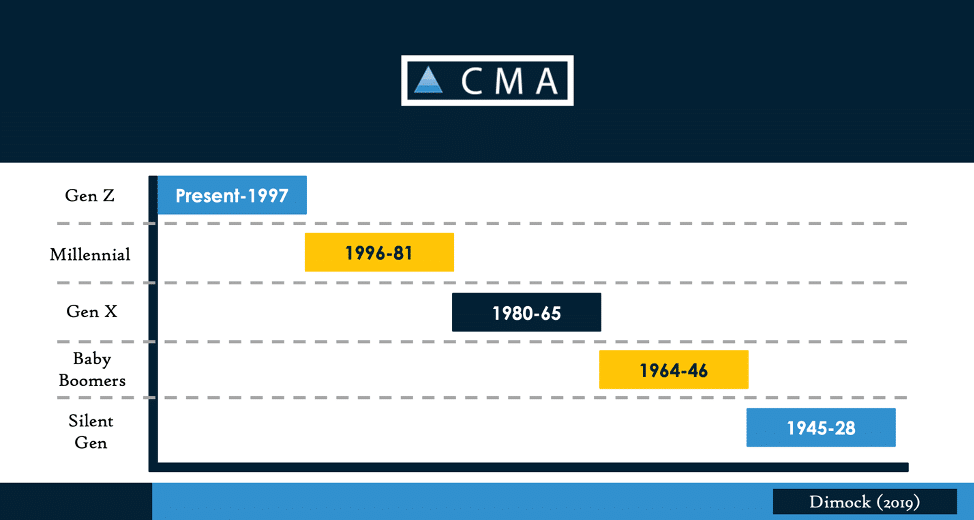How to Handle a Multigenerational Return-to-Work Strategy
Bottom Line: Remote, in-office, and hybrid approaches should reflect the nuances of your multigenerational workforce.
Will your organization bring you back into the office? Do you get to stay remote? Is your company going hybrid?
These are the questions people are being asked all over the country, as we finally begin socializing after a year of quarantine. The truth is, your preference may totally differ from some of your friends or colleagues at work. Each person has unique motivators, personality, and responsibilities at home which can influence someone’s personal preference about working in the office, at home, or somewhere in between.
It is also becoming clear that this topic is gaining serious traction on websites like LinkedIn. The LinkedIn News team, authored by Jake Perez, posted an article titled “Gen Z embrace WFH, boomers level up,” catching the eyes of 40,000+ readers. This news story raises an important point; add demographic data to the list of influencing factors.

Organizations have been balancing a multigenerational workforce for some time now (Dobbs et al., 2007). However, the pandemic forced many companies to adopt a remote work or work-from-home (WFH) model (Vasel, 2021). This created significant change for everyone forced to deal with the consequences. On the other side of it all, there were some added benefits for those with newly minted home offices.
For many, returning to work is a complex endeavor, only made more complex by the nuances of a multigenerational workforce. Below, we highlight some key generational takeaways, as they pertain to the “future of work,” whether that be in-person, fully remote, or hybrid.

Silent Generation (Ages 76-93)
This group of employees is growing smaller and smaller (Fry, 2018). Therefore, there is limited data highlighting the preference of work style for the Silent Generation. However, human nature leads us to believe extensive change can be a catalyst for turnover (Holtom et al., 2005). In this case, a major shift to remote work may have led to increased retirement of the remaining members in the workforce.
Baby Boomers (Ages 57-75)
Back in 2019, Baby Boomers were staying in the workforce longer than previous generations (Fry, 2019). Fast-forward 16 months, and the pace of Baby Boomer retirements accelerated to an eight-year high (Fry, 2020). According to a Conference Board survey of 3,600+ US employees (late May – early June), 43% of Baby Boomers are comfortable returning to the office (2021). Those numbers were the highest when compared to Gen X and Millennials, suggesting a relative acceptance of plans for returning to the office.
Gen X (Ages 41-56)
Gen X is often left out of these discussions, perhaps due to limited size and lacking relative novelty. Gen X finally overtook the Baby Boomers as the largest generation in the workforce back in 2012, only to be surpassed by Millennials in 2016 (Fry, 2018). Yet, they bring valuable experience and skills which can be critical to successful organizations. The same Conference Board survey found 38% of Gen X are comfortable returning to the office (2021). Part of this desire to remain remote may have to do with the hard-earned skills Gen X learned amid the quarantine. Specifically, a survey published by Adobe, contrasting employee attitudes from Q1 and Q4 of 2020, showed a boost in communication confidence (e.g., conflict resolution, building trust in a new environment, etc.) among Gen X respondents (Adobe, 2021).
Millennials (Ages 25-40)
Perhaps the generation best known for having high expectations, or in other words, being spoiled (Kight, 2018). In 2018, 54% of Millennials surveyed claimed they would quit their jobs if money were of no concern. The Conference Board survey reveals that Millennials lead the charge on questioning the return-to-office strategy (2021). This group also is the least comfortable returning to the workplace (24% are comfortable). This perspective may be influenced by aging into parenthood and a traditional acceptance of technology. Organizational leaders will need to pay particular attention to this group, as they have been the largest demographic in the workforce since 2016 (Fry, 2018).
Gen Z (Ages 24 and Younger)
The new kids on the block or, should we say, the virtual office. While the Conference Board survey did not include this age range, recent polls indicate a reversal of the trend, with an emphasis on flexibility. Sixty-five percent (65%) of Gen Z employees expect remote work options (Hoskins, 2021). Considering only 29% of job seekers, regardless of age, consider remote work options ahead of applying for a job, Gen Z shows a unique appreciation (Johnson, 2021). Yet, 88% of Gen Z job seekers desire to meet in-person, frequently (Johnson, 2021). This preference is substantially higher compared to the 55% of job seekers, 25 years and older, who voiced a preference to meet in-person frequently. Other surveys support that Gen Z should not be painted as a generation that wants to work from home exclusively (Gurchiek, 2021).

The data suggests a wide gap comparing in-office and WFH preferences. We also recommend taking this information with a grain of salt. As psychologists, we understand the importance, and potential pitfalls, of sample size and generalizability. CMA strongly recommends surveying your employees to 1) establish buy-in; and 2) ensure the organizational data informs your strategy. Our consultants can work with you to create an engaging solution, based on organizational needs, and influenced by employee voice.
By Zach Stinebaugh, M.A.
References
Adobe. (2021, March 25). State of work report: Employees more invested in work than ever – expect the same in return. Adobe. https://blog.adobe.com/en/publish/2021/03/25/studies-show-workers-are-more-invested-in-work-than-ever-and-expect-the-same-in-return.html#gs.9q76n0
Conference Board. (2021, July 1). Survey: Amid higher productivity, 43 percent of US workers question need to return to workplace. Conference Board. https://conference-board.org/press/Return-to-Work-Survey-June2021
Dimock, M. (2019, January 17). Defining generations: Where Millennials end and Generation Z begins. Pew Research Center. https://www.pewresearch.org/fact-tank/2019/01/17/where-millennials-end-and-generation-z-begins/
Dobbs, J., Healey, P., Kane, K., Mak, D., & McNamara, T. K. (2007, July). The multi-generational workplace. The Center on Aging & Work at Boston College. https://www.bc.edu/content/dam/files/research_sites/agingandwork/pdf/publications/FS09_MultiGenWorkplace.pdf
Fry, R. (2018, April 11). Millennials are the largest generation in the U.S. labor force. Pew Research Center. https://www.pewresearch.org/fact-tank/2018/04/11/millennials-largest-generation-us-labor-force/
Fry, R. (2019, July 24). Baby Boomers are staying in the labor force at rates not seen in generations for people their age. Pew Research Center. https://www.pewresearch.org/fact-tank/2019/07/24/baby-boomers-us-labor-force/
Fry, R. (2020, November 9). The pace of Boomer retirements has accelerated in the past year. Pew Research Center. https://www.pewresearch.org/fact-tank/2020/11/09/the-pace-of-boomer-retirements-has-accelerated-in-the-past-year/
Gurchiek, K. (2021, January 27). Hybrid work model likely to be new norm in 2021. Society for Human Resource Management (SHRM). https://www.shrm.org/hr-today/news/hr-news/pages/hybrid-work-model-likely-to-be-new-norm-in-2021.aspx
Holtom, B. C., Mitchell, T., Lee, T., & Inderrieden, E. J. (2005). Shocks as causes of turnover: What they are and how organizations can manage them. Human Resource Management 44(3), 337-352. https://doi.org/10.1002/hrm.20074
Hoskins, H. (2021, July 6). How Gen-Z will change the future of hybrid work. Cisco. https://newsroom.cisco.com/feature-content?type=webcontent&articleId=2175231
Johnson, K. (2021, June 16). The multigenerational workforce: What you need to know to hire now. iCIMS. https://www.icims.com/company/blog/the-multigenerational-workforce-what-you-need-to-know-to-hire-now/
Kight, S. W. (2018, March 10). Poll: People view millennials as “spoiled” and “lazy.” Axios. https://www.axios.com/millennials-a-tale-of-two-generations-ff2a6de5-cfde-42c5-ab38-ec0908fbfcc9.html
Perez, J. (2021, August 21). Gen Z embrace WFH, Boomers Level Up. LinkedIn News. https://www.linkedin.com/news/story/gen-z-embrace-wfh-boomers-level-up-5124204/
Vasel, K. (2021, March 11). The pandemic forced a massive remote-work experiment. Now comes the hard part. CNN Business. https://www.cnn.com/2021/03/09/success/remote-work-covid-pandemic-one-year-later/index.html
